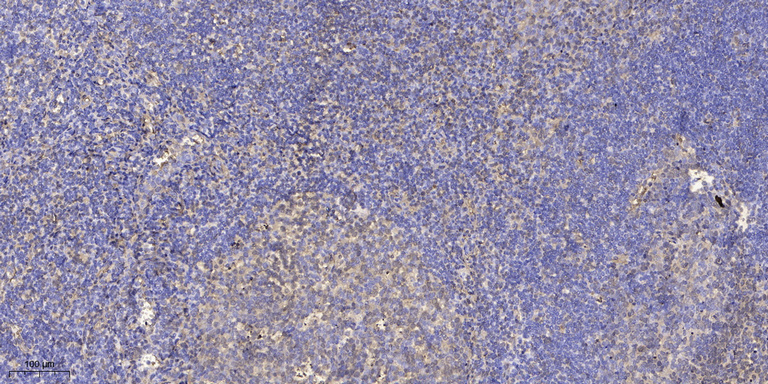UBE2G1 Polyclonal Antibody
- Catalog No.:YT4799
- Applications:IHC;IF;ELISA
- Reactivity:Human;Mouse;Rat
- Target:
- UBE2G1
- Fields:
- >>Ubiquitin mediated proteolysis;>>Protein processing in endoplasmic reticulum;>>Parkinson disease;>>Pathways of neurodegeneration - multiple diseases
- Gene Name:
- UBE2G1
- Protein Name:
- Ubiquitin-conjugating enzyme E2 G1
- Human Gene Id:
- 7326
- Human Swiss Prot No:
- P62253
- Mouse Gene Id:
- 67128
- Mouse Swiss Prot No:
- P62254
- Rat Gene Id:
- 64631
- Rat Swiss Prot No:
- P62255
- Immunogen:
- Synthesized peptide derived from the Internal region of human UBE2G1.
- Specificity:
- UBE2G1 Polyclonal Antibody detects endogenous levels of UBE2G1 protein.
- Formulation:
- Liquid in PBS containing 50% glycerol, 0.5% BSA and 0.02% sodium azide.
- Source:
- Polyclonal, Rabbit,IgG
- Dilution:
- IHC 1:100 - 1:300. ELISA: 1:40000.. IF 1:50-200
- Purification:
- The antibody was affinity-purified from rabbit antiserum by affinity-chromatography using epitope-specific immunogen.
- Concentration:
- 1 mg/ml
- Storage Stability:
- -15°C to -25°C/1 year(Do not lower than -25°C)
- Other Name:
- UBE2G1;UBE2G;Ubiquitin-conjugating enzyme E2 G1;E217K;UBC7;Ubiquitin carrier protein G1;Ubiquitin-protein ligase G1
- Molecular Weight(Da):
- 20kD
- Background:
- The modification of proteins with ubiquitin is an important cellular mechanism for targeting abnormal or short-lived proteins for degradation. Ubiquitination involves at least three classes of enzymes: ubiquitin-activating enzymes, or E1s, ubiquitin-conjugating enzymes, or E2s, and ubiquitin-protein ligases, or E3s. This gene encodes a member of the E2 ubiquitin-conjugating enzyme family and catalyzes the covalent attachment of ubiquitin to other proteins. The protein may be involved in degradation of muscle-specific proteins. [provided by RefSeq, Jul 2008],
- Function:
- catalytic activity:ATP + ubiquitin + protein lysine = AMP + diphosphate + protein N-ubiquityllysine.,function:Catalyzes the covalent attachment of ubiquitin to other proteins. May be involved in degradation of muscle-specific proteins.,pathway:Protein modification; protein ubiquitination.,similarity:Belongs to the ubiquitin-conjugating enzyme family.,tissue specificity:Widely expressed, mainly in skeletal muscle.,
- Subcellular Location:
- cytoplasm,extracellular exosome,
- Expression:
- Widely expressed, mainly in skeletal muscle.
- June 19-2018
- WESTERN IMMUNOBLOTTING PROTOCOL
- June 19-2018
- IMMUNOHISTOCHEMISTRY-PARAFFIN PROTOCOL
- June 19-2018
- IMMUNOFLUORESCENCE PROTOCOL
- September 08-2020
- FLOW-CYTOMEYRT-PROTOCOL
- May 20-2022
- Cell-Based ELISA│解您多样本WB检测之困扰
- July 13-2018
- CELL-BASED-ELISA-PROTOCOL-FOR-ACETYL-PROTEIN
- July 13-2018
- CELL-BASED-ELISA-PROTOCOL-FOR-PHOSPHO-PROTEIN
- July 13-2018
- Antibody-FAQs
- Products Images

- Immunohistochemical analysis of paraffin-embedded human tonsil. 1, Antibody was diluted at 1:200(4° overnight). 2, Tris-EDTA,pH9.0 was used for antigen retrieval. 3,Secondary antibody was diluted at 1:200(room temperature, 30min).



